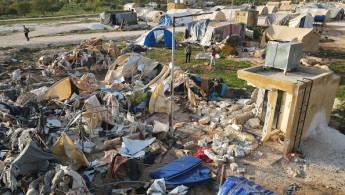UN: Violence in Syria has reached the worst point in 4 years
The head of the U.N. Commission of Inquiry on Syria said Tuesday that fighting in the country has reached its worst point in years, with devastating consequences for civilians.
“We are witnessing the largest escalation of hostilities in Syria in four years,” Paulo Pinheiro told the U.N. General Assembly. “Yet again there appears to be total disregard for civilians," he added.
A drone strike earlier this month on the Homs Military Academy killed 89 people, including 31 women and five children , and wounded as many as 277. No group claimed responsibility for the attack but the Assad regime accused insurgents “backed by known international forces” of carrying it out and then, accompanied by Russia, launched a brutal campaign of airstrikes on opposition-held areas of northwest Syria in retaliation.
“In just four days of ground shelling... some 200 civilians were killed and injured, and medical facilities, schools and markets were impacted yet again,” Pinheiro said. “Tens of thousands are again displaced and on the run.”
Meanwhile, in retaliation for an attack in Ankara that injured two members of Turkish security forces, Turkey pounded Kurdish-controlled areas in northeast Syria that it said were used by the Kurdistan Workers’ Party, or PKK — a Kurdish separatist group that has waged a decades long insurgency in Turkey — as well as its allies in Syria in the People’s Defense Units, or YPG.
The Turkish bombing resulted in “destroying and damaging power and water stations, affecting hundreds of thousands of civilians,” Pinheiro said.
He also pointed to recent airstrikes on the Damascus and Aleppo airports in government-held Syria, reportedly by Israel that put both out of commission and “may have yet again impacted the delivery of humanitarian aid.”
Syria’s uprising-turned civil war , now in its 13th year, erupted when the regime of Syrian dictator Bashar al-Assad responded to peaceful protests with military violence, killing nearly half a million people, displacing half of its prewar population of 23 million and crippling infrastructure in both Assad regime and opposition-held areas.





 Follow the Middle East's top stories in English at The New Arab on Google News
Follow the Middle East's top stories in English at The New Arab on Google News


